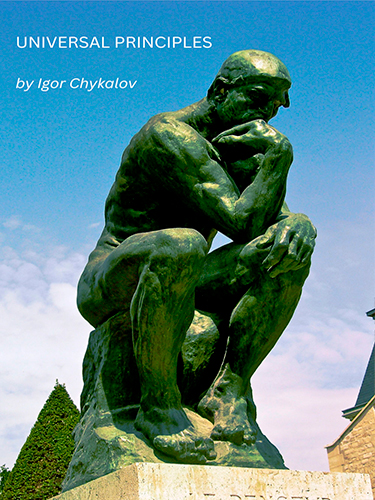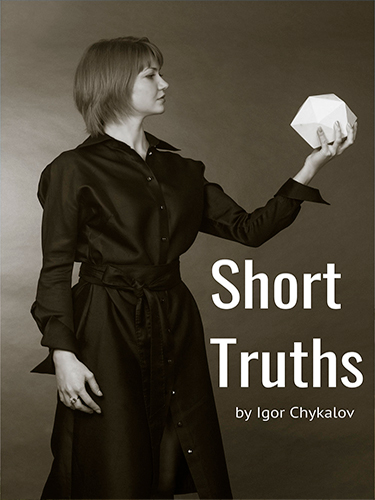Comment on thinking
This is my original commentary to an article at Medium.com about thinking (September 16, 2019).
![Comment on thinking]()
Image from Pexels.com
I recently placed a comment to Zat Rana’s old article about Friedrich Nietzsche and Medium has sent me another article of the same author probably because of that. Frankly, I wasn’t very much interested, but since the article has already been there and the theme of it was within my scope of interests...
I pushed myself hard to read the article until the end. Why is that philosophic stuff so boring? The correct answer is - the authors (Nitzsche, Schopenhauer or Zat Ratna) show to the reader the shiny magic door behind the old canvas, but do not give the key to open it. That’s why the multitude of even famous philosophers can offer just their loose interpretations of the piece of the whole puzzle which they somehow saw. The bigger this visible piece is, the more that thinker influenced mankind like Aristotle, for example. The vast majority of philosophical books are remote from mundane life and are perceived by readers as being “not here” and “not now”.
As regards the article “It’s Not What You Know, It’s How You Think” - I cannot say everything in the article is right. For example, “understanding of your pattern-seeking mind” will not bring you any wisdom, because real wisdom has nothing to do with the mind. Mind just distracts you from the wisdom.
I cannot say everything in the article is wrong. For example, “how we think about what is happening around us is arguably more important than what is actually happening around us”.
It is called Maya in esotericism, in ancient Indian philosophy and truly is the product of the human mind.
The statement of “how we think affects everything from our ability to solve problems to how we understand meaning, value, and purpose” is true, but very shallow. There are a few layers of understanding underneath. For example, the way we see something limits the perception and thus the way we think about that, and the visibility of an object depends much on the light, that’s why all the cats are grey in the dark...
Therefore, the article is unpractical (you cannot understand what to do and why) just like almost everything in philosophy. From that point of view, it is really about nothing. “The guy heard the song, but rehashed it wrong”. But this is the best article of Zat Rana, judging by the quantity of claps, that’s why I made myself to read it and write this comment. The most intriguing thing for me was the statistics - 75K of claps and over 200 comments. Many people were really interested in such “remote” stuff and spent their 6 minutes reading it. I write on subjects of philosophy in particular and was pleased to find so big interest.
P.S. Dear Reader! I am very much interested in your opinion on the subject of this article. Please, write a comment or ask a question if you want to clarify something.
Yours,
Igor Chykalov
..........

Image from Pexels.com
I recently placed a comment to Zat Rana’s old article about Friedrich Nietzsche and Medium has sent me another article of the same author probably because of that. Frankly, I wasn’t very much interested, but since the article has already been there and the theme of it was within my scope of interests...
I pushed myself hard to read the article until the end. Why is that philosophic stuff so boring? The correct answer is - the authors (Nitzsche, Schopenhauer or Zat Ratna) show to the reader the shiny magic door behind the old canvas, but do not give the key to open it. That’s why the multitude of even famous philosophers can offer just their loose interpretations of the piece of the whole puzzle which they somehow saw. The bigger this visible piece is, the more that thinker influenced mankind like Aristotle, for example. The vast majority of philosophical books are remote from mundane life and are perceived by readers as being “not here” and “not now”.
As regards the article “It’s Not What You Know, It’s How You Think” - I cannot say everything in the article is right. For example, “understanding of your pattern-seeking mind” will not bring you any wisdom, because real wisdom has nothing to do with the mind. Mind just distracts you from the wisdom.
I cannot say everything in the article is wrong. For example, “how we think about what is happening around us is arguably more important than what is actually happening around us”.
It is called Maya in esotericism, in ancient Indian philosophy and truly is the product of the human mind.
The statement of “how we think affects everything from our ability to solve problems to how we understand meaning, value, and purpose” is true, but very shallow. There are a few layers of understanding underneath. For example, the way we see something limits the perception and thus the way we think about that, and the visibility of an object depends much on the light, that’s why all the cats are grey in the dark...
Therefore, the article is unpractical (you cannot understand what to do and why) just like almost everything in philosophy. From that point of view, it is really about nothing. “The guy heard the song, but rehashed it wrong”. But this is the best article of Zat Rana, judging by the quantity of claps, that’s why I made myself to read it and write this comment. The most intriguing thing for me was the statistics - 75K of claps and over 200 comments. Many people were really interested in such “remote” stuff and spent their 6 minutes reading it. I write on subjects of philosophy in particular and was pleased to find so big interest.
----------------------------------------------------------------------
P.S. Dear Reader! I am very much interested in your opinion on the subject of this article. Please, write a comment or ask a question if you want to clarify something.
Yours,
Igor Chykalov
Comment
✚ Add comment







